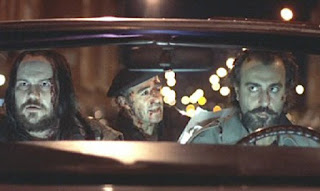
This is the life story of Spaniard Ramón Sampedro, who fought a 30-year campaign to win the right to end his own life with dignity. The film explores Ramón's relationships with two women: Julia, a lawyer suffering from Cadasil syndrome, who supports his cause, and Rosa, a local woman who wants to convince him that life is worth living. Through the gift of his love, these two women are inspired to accomplish things they never previously thought possible.in another words Two of the most talented figures in contemporary Spanish cinema -- actor Javier Bardem and director Alejandro Amenábar -- collaborate for this powerful drama, based on a true story. Ramón Sampedro (Javier Bardem) was a fisherman and part-time poet who, at the age of 26, suffered an accident while diving that left him a bedridden quadriplegic. Now 54, Ramón must depend on his family to survive -- his macho brother José (Celso Bugallo), José's wife, Manuela (Mabel Rivera), and their son, Javi (Tamar Novas). While grateful to his family and friends for their help, Ramón was always an active person, and as the years wore on, he has come to see his life as frustrating and pointless and wishes to die with what remains of his dignity. José, however, is bitterly opposed to the notion of assisted suicide, and Spanish laws would implicate anyone who helped Ramón end his own life, which is something Ramón does not want to do. Through Gené (Carla Segura), a friend who works with a "Right to Die" organization, Ramón is introduced to Julia (Belen Rueda), a lawyer he hopes will help him persuade the courts to let him end his own life. Julia is dealing with her own mortality issues since being diagnosed with a degenerative disease, and Ramón hopes her condition will make her arguments more persuasive. As Ramón and Julia work together on his case and help to prepare a book of his poems for publication, Ramón finds himself falling in love with his attorney, who happens to be married, but while his infatuation gives Julia second thoughts about the case, Ramón remains convinced that the greatest gift to him would be an end to his life. Javier Bardem's performance in The Sea Inside (aka Mar Adentro) earned him the Best Actor award at the 2004 Venice
Film Festival.
Leagues beyond a disease-of-the-week
movie, and a total departure for its director, The Sea Inside is a potent emotional journey anchored by powerhouse performances. It turns out that Alejandro Amenábar, known for gothic horror (The Others) and existentialism (Abre los Ojos), can do lyrical intimacy with equal finesse. Amenábar's technique is partly responsible for bringing Ramon Sampedro to life; his camera explores the rolling landscape of Sampedro's mind, as well as the photographs of his bedroom, which show the rich exuberance of Ramon's youth. But The Sea Inside wouldn't be half the experience without the work of Javier Bardem. He's such a charismatic figure, so quick to flirt or joke, that he can seduce even from his state of permanent recline, and at times, the 2004 Oscar winner for Best Foreign
Film is equally satisfying as a wistful romance. Ramon's very quickness of wit provides the film with a central conundrum: how can a person who seems so harmonious with his world want to end his life? The Spanish countryside provides an idyllic backdrop for such weighty philosophical debate, deceptively appropriate in the way it accentuates the fragile beauty of life -- especially as captured through Javier Aguirresarobe's cinematography. Amenábar's script is also keenly attuned to life's absurdities. A memorable argument transpires between Ramon, stubbornly confined to his bed, and a paralyzed priest, down two floors because his wheelchair couldn't be carried any higher into the house. A messenger runs between the two, exchanging barbs, but their polarized views lie a much greater distance apart. Ramon's sardonic outlook on religious salvation cannot be shaken, and Bardem's performance convinces the audience there's no reason it should be. The range of perspectives of those who care about him lends the film additional poignancy, never crossing over into maudlin sentiment.















